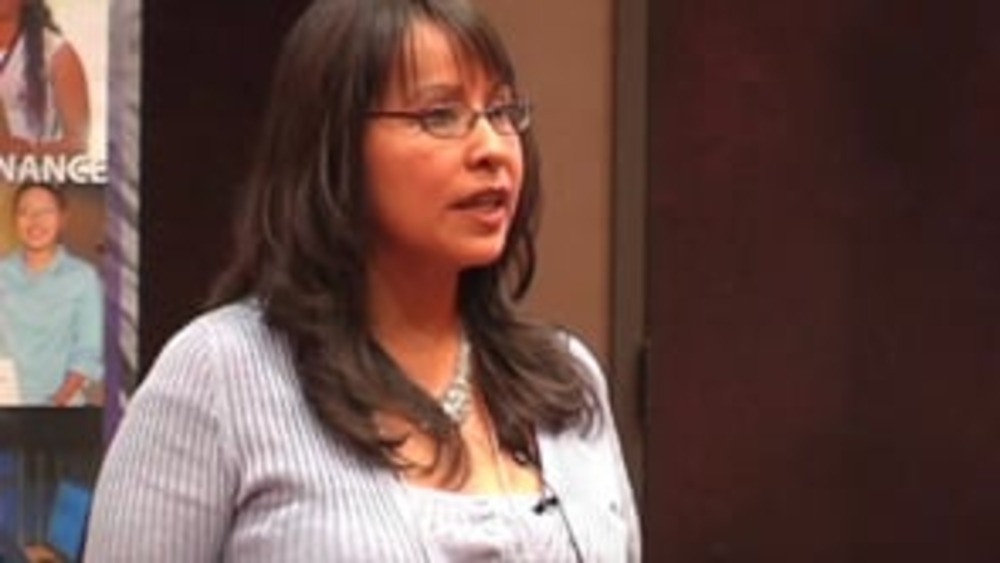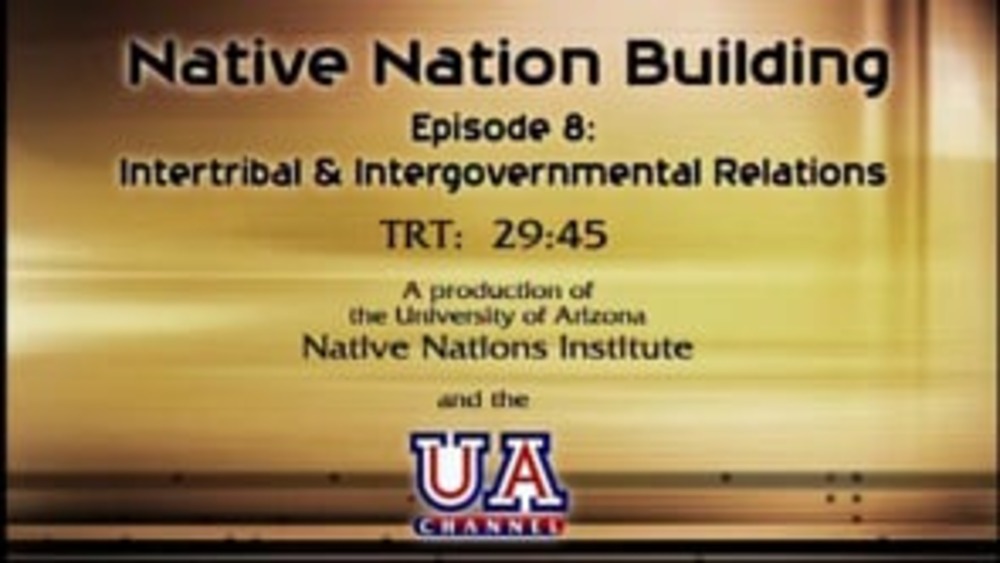Native leaders explain the importance of Native nations building their capacity to effectively engage in the development and maintenance of intergovernmental relationships with other sovereign governments, stressing that doing so is a critical component of the full exercise of tribal sovereignty.
Additional Information
Ettawageshik, Frank. Native Nations Institute for Leadership, Management, and Policy. University of Arizona, Tucson, Arizona. April 13, 2010. Interview.
Killer, Kevin. Native Nations Institute for Leadership, Management, and Policy, University of Arizona. Rapid City, South Dakota. May 24, 2010. Interview.
Marquez, Deron. Native Nations Institute for Leadership, Management, and Policy. University of Arizona, Tucson, Arizona. March 26, 2009. Interview.
McCoy, John. Native Nations Institute for Leadership, Management, and Policy, University of Arizona. Cambridge, Massachusetts. September 18, 2009. Interview.
Penney, Sam. Native Nations Institute for Leadership, Management, and Policy, University of Arizona. Tucson, Arizona. August 20, 2010. Interview.
Sampsel, Roy. Native Nations Institute for Leadership, Management, and Policy, University of Arizona. Tucson, Arizona. August 31, 2010. Interview.
Vizenor, Erma. "Engaging the Nation's Citizens and Effecting Change: Stories from Indian Country." Emerging Leaders seminar. Native Nations Institute for Leadership, Management, and Policy, University of Arizona. Tucson, Arizona. March 25, 2010. Presentation.
Transcript
Erma Vizenor:
"We have to function outside of our reservation and our tribe. We have to deal with companies. We have to deal with the federal government. We have to deal with the states. And so we have to have structures and institutions that empower us so that we are never taken advantage of again."
Frank Ettawageshik:
"When you acknowledge that sovereignty in yourself and in others, then you have to exercise or negotiate that sovereignty with your neighbors. So what I think is here is that you're constantly working with those other sovereigns, but you need to figure out how to decide who you're dealing with and who you aren't. And so the most basic way of that is that if somebody else acknowledges you, well you can acknowledge them, but you have to have some sort of a process for that. What this clause in our constitution does is it establishes a basis for some office, or staff person, or somebody that would be akin to a state department, for instance, where there is an international relations office that deals with negotiations with other sovereigns and those types of things."
John McCoy:
"My advice to them all is to create a governmental affairs office, where these folks just work on policy, that they work with state legislatures, with county governments, with other city governments. Because you need to touch them all, because they pass laws that infringe on the tribal sovereignty. So you need to be there to educate them so that they modify their law to where it does no harm to the tribal sovereignty. They're not doing -- my personal opinion -- 99 percent of them, of these laws that infringe on tribal sovereignty, is done out of ignorance not maliciousness. It's out of ignorance. Once you inform them, educate them on the issue, then they adjust their language to where they do no harm. So they need to be at the city level, the county level, the state level, and we've always done the federal level."
Roy Sampsel:
"A part of the strength of tribal governments and tribal nation building is the capacity of that nation to perform seriously for its broader community, and for the lands, and for that seven generations, for that future. So the strength of these is to deal with them in not a casual manner but a serious manner, and to do it in such a way that you're asking the same standards that you're applying to your nation and to your government to be the means by which other governments are entering into those agreements with you. It does not do any good to say, 'Gee, I wish that our state had a better system by which people could know about Indian people and Indian tribes.' A wonderful sort of sentiment, but where's the commitment to do that? Are you going to encourage curriculum development? If curriculum is developed, is it going to get into the school systems? In other words, it's not the recognition of either the problem and/or the opportunity, it's the commitment over time to make that work."
Deron Marquez:
"Well it was once said that, 'How do you know you're a nation?' Well the answer to that was you're recognized by another nation. And so you need to forge those gaps, be it cities, counties, states or federal government, or even foreign nations. We've had visitors from China come in and visit our reservation and talk with us. Those are the things that I think nation-building leaders tackle. And while doing so, I think it's very critical when they're out there doing that, they're not just representing your nation. You're representing all nations and to act accordingly, but have the understanding that what you do -- you're authentic voice, is what I always say -- still resonates from your community and your people."
Sam Penney:
"I think first of all we need to educate ourselves and to know exactly what those other entities do and what their purpose and function and mission is. I think that's very important for a tribal leader to understand that. Then I think secondly, going out on the national state and local level and being present to represent your tribe is important as well. And I think thirdly, just continuing that dialogue with various people you meet throughout your travels. I've often found that most of the long-lasting friendships and relationships that I have is talking with people informally. May not even be during the actual meeting, it's either out in the hallway or at a luncheon, or something like that. That's where you get the one-on-one and build that personal relationship that goes a long ways and building that trust between yourself and other individuals that you're going to be working with."
Kevin Killer:
"Understand that you're coming into this with a different frame of mind, a different set of experiences than somebody else who grew up in a different part of the state who may have never have had contact with Native communities. And really empathize with that mindset because if you don't, if you hold on to what you believe in, and the other side holds on to what they believe in, then there's going to be no workability, I guess. And so if you can't work beyond what you believe or what you think you know is true, then there's going to be no compromise. There's going to be no solutions... That's the thing that I would encourage all tribal leaders to remember, is that there's always something that we can look at. We can agree on something, something that needs to be improved, especially if we're committed in this for future generations and the future of our nations, whether that's a statehood, or whether that's a Native nationhood, or [the] federal government. We're all in this together, and ensuring that that never leaves the room is that we're all in this together. So how are we going to work for everybody in the future?"


